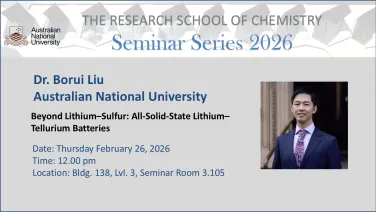RSC School Seminar - Dr. Ziyun Wang
Rational Catalyst Design for CO2 Electrochemical Reduction Reaction
Speakers
Event series
Content navigation
Description

Rational Catalyst Design for CO2 Electrochemical Reduction Reaction
Electrochemical CO2 reduction (CO2RR) offers a promising route for converting CO2 into valuable chemicals and fuels using renewable electricity. However, significant challenges remain in terms of product selectivity, energy efficiency, and long-term stability, particularly when using industrially-relevant CO2 sources. This talk will present recent advancements in CO2RR, drawing from several cutting-edge studies that address these challenges from multiple angles.
In this talk, we will first introduce a general computational framework for catalyst design. Then, we will use density functional theory (DFT) calculations to understand the reaction pathways of CO2RR to multiple products. The reaction barriers and enthalpy changes are calculated for the elementary steps considered in all the pathways on Cu(100). We will then introduce the selectivity determinants based on microkinetic modelling.
We will discuss novel catalyst designs, including cationic-group-functionalized copper catalysts that enable stable acidic CO2 electrolysis with high selectivity towards multi-carbon products. The role of the catalyst-electrolyte interface in promoting CO2 activation while suppressing competing reactions will be examined. We'll also explore system-level innovations, such as proton-exchange membrane electrolysers that achieve durable CO2 conversion to formic acid using recycled lead catalysts. Furthermore, we’ll address the critical issue of catalyst poisoning by trace impurities in industrial CO2 streams, presenting strategies to improve SO2 tolerance through rational catalyst and electrode design. The talk will highlight how these advances, combining computational chemistry and experiments, collectively push the boundaries of CO2RR performance. By integrating insights from catalyst development, reaction mechanisms, and electrolyser engineering, this work demonstrates significant progress towards making CO2 electrolysis a viable technology for large-scale carbon utilization and renewable fuel production.
Biography
Dr. Ziyun Wang is a computational chemist specializing in theoretical catalysis and machine learning. He began his research career in theoretical catalysis at the Queen’s University of Belfast and the University of Manchester under the guidance of Prof. Peijun Hu and Prof. Chris Hardacre. This was followed by postdoctoral research with Prof. Jens Nørskov and Prof. Thomas Bligaard at Stanford University and with Prof. Edward Sargent at the University of Toronto. In 2021, Dr. Wang joined the School of Chemical Sciences at the University of Auckland, and he is now a Senior Lecturer (Above the Bar).
Dr. Wang has authored 154 peer-reviewed papers and one book chapter. Over the last five years, he has served as the corresponding author on publications in leading journals such as Nature, Science, Nature Chemistry, Nature Energy, and Nature Catalysis. His work has garnered over 16,000 citations, reflecting an h-index of 54. He was named a Global Highly Cited Researcher by Clarivate Analytics in 2024.
Location
Bldg. 138, Lvl. 3, Seminar Room 3.105

